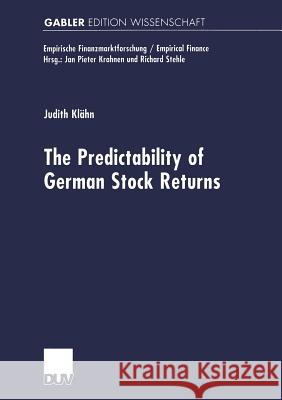The Predictabilty of German Stock Returns » książka
The Predictabilty of German Stock Returns
ISBN-13: 9783824471027 / Angielski / Miękka / 2000 / 142 str.
Ten years ago, most textbooks on financial management advocated the thesis that stock returns are essentially unpredictable. This theory is called the Random Walk Approach to the development of asset prices. The approach said that the stock market is subject to random changes, which are, by definition, unpredictable. Apparent predictabilities, if ever discovered, were either dismissed as statistical artifacts or as data that cannot be exploited after transaction costs. In the meantime, the world of financial economics has turned upside down. We now realize clearly that returns are indeed predictable to a large extent. Recent studies have confirmed that U.S. stock returns are highly predictable. In this new research context, Judith Klahn posed the question whether German stock returns follow the same pattern. The predictability of German stock returns is the topic of her thesis. She is in a position to identify the relevant variables in the German context. Her basic result is that the driving forces of the German stock market and the U.S. stock market differ in most aspects. According to the Handelsblatt, Judith Klahn's statement is: "Deutscher Aktienmarkt ist kaum mit der Wall Street vergleichbar" (No. 120, June 25, 1999, p. 47).











